
gem
A Gym for Generalist LLMs
Stars: 120
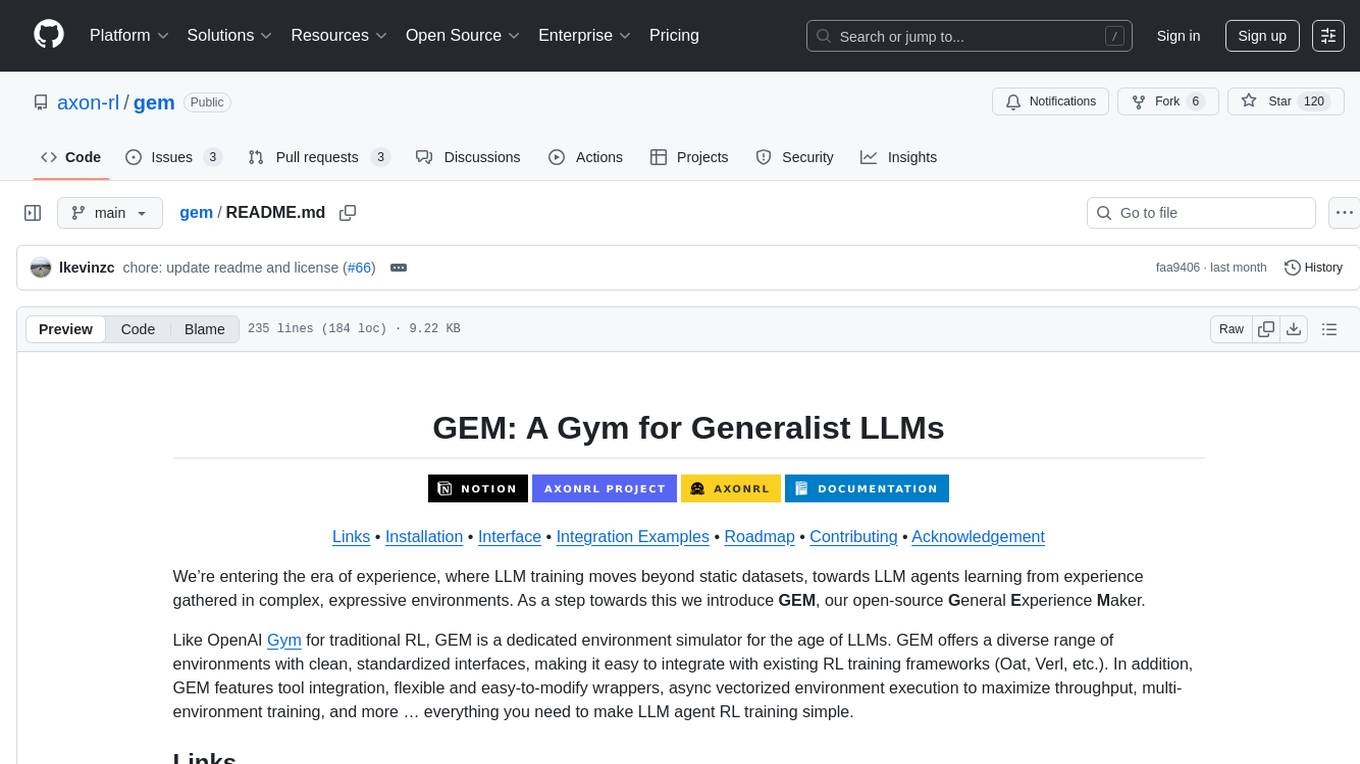
GEM is an open-source General Experience Maker designed for training Large Language Models (LLMs) in dynamic environments. Similar to OpenAI Gym for traditional Reinforcement Learning, GEM provides a variety of environments with standardized interfaces for seamless integration with existing LLM training frameworks. It offers tool integration, flexible wrappers, async vectorized environment execution, multi-environment training, and more to simplify LLM agent training.
README:
We’re entering the era of experience, where LLM training moves beyond static datasets, towards LLM agents learning from experience gathered in complex, expressive environments. As a step towards this we introduce GEM, our open-source General Experience Maker.
Like OpenAI Gym for traditional RL, GEM is a dedicated environment simulator for the age of LLMs. GEM offers a diverse range of environments with clean, standardized interfaces, making it easy to integrate with existing RL training frameworks (Oat, Verl, etc.). In addition, GEM features tool integration, flexible and easy-to-modify wrappers, async vectorized environment execution to maximize throughput, multi-environment training, and more … everything you need to make LLM agent RL training simple.
-
GEM: Gym for Generalist LLMs
- 📜 Blog
- 🚀 Release tweet
- 📄 Documentation
Install GEM from PyPI:
pip install -U gem-llmTo use the search tool, run the following to install extra dependencies:
pip install -U 'gem-llm[search]'
conda install -c pytorch -c nvidia faiss-gpu=1.8.0GEM's interface closely follows Gym's API. Here's an example using the "game:GuessTheNumber-v0" environment:
import gem
# List all supported environments
gem.print_envs()
# Initialize the environment
env = gem.make("game:GuessTheNumber-v0")
# Reset the environment to generate the first observation
observation, info = env.reset()
# Start the agent-environment loop
while True:
action = env.sample_random_action() # insert policy here, e.g.,
# (pseudocode) action = llm.generate(observation)
# apply action and receive next observation, reward
# and whether the episode has ended
next_observation, reward, terminated, truncated, info = env.step(action)
print("OBS", observation)
print("ACT", action)
# update the policy (online) here
# e.g., policy = learn(policy, observation, action, reward, info)
observation = next_observation
# Exit when the episode terminates
if terminated or truncated:
breakBelow are examples for enabling tools within environments.
Example using the Python tool:
from transformers import AutoTokenizer
import gem
from gem.tools.python_code_tool import PythonCodeTool
from gem.tools.tool_env_wrapper import ToolEnvWrapper
from gem.wrappers.wrapper_factory import WRAPPER_FACTORY
env = gem.make("math:GSM8K")
tool = PythonCodeTool()
wrapped_env = ToolEnvWrapper(env, tools=[tool])
wrapped_env = WRAPPER_FACTORY["concat_chat"](
wrapped_env, tokenizer=AutoTokenizer.from_pretrained("Qwen/Qwen3-0.6B")
)
obs, info = wrapped_env.reset()
# we ignore the obs and use a dummy action
dummy_action = "<think>Let me compare 9.9 and 9.11 using python.</think><python>print('9.9 > 9.11?', 9.9 > 9.11)</python>"
obs, reward, terminated, truncated, info = wrapped_env.step(dummy_action)
print(obs)
# continue to sample the next response given the tool results ...
wrapped_env.close()Example using the search tool:
# assume you have search server running
env = gem.make("game:GuessTheNumber-v0", max_turns=2)
tool = SearchTool(search_url="http://localhost:8000/retrieve", topk=2)
wrapped_env = ToolEnvWrapper(env, tools=[tool], max_tool_uses=1)
wrapped_env = WRAPPER_FACTORY['concat_chat'](wrapped_env, tokenizer=AutoTokenizer.from_pretrained("Qwen/Qwen3-0.6B"))
wrapped_env.reset()
dummy_action = "<think>I need to search for Python list comprehension examples</think><search>Python list comprehension examples</search>"
obs, reward, terminated, truncated, info = wrapped_env.step(dummy_action)
print(obs)Click to get the complete runnable code
import subprocess
import time
from transformers import AutoTokenizer
import gem
from gem.tools.search_tool import SearchTool
from gem.tools.tool_env_wrapper import ToolEnvWrapper
from gem.wrappers.wrapper_factory import WRAPPER_FACTORY
# start the search server
serp_api_key = "add you api key" # get api at https://serpapi.com/manage-api-key
server_process = subprocess.Popen([
'python', '-m', 'gem.tools.search_engine.serp_search_server',
'--search_url', 'https://serpapi.com/search',
'--topk', '2', '--serp_api_key', serp_api_key
])
time.sleep(5)
# interact using search tool
env = gem.make("game:GuessTheNumber-v0", max_turns=2)
tool = SearchTool(search_url="http://localhost:8000/retrieve", topk=2)
wrapped_env = ToolEnvWrapper(env, tools=[tool], max_tool_uses=1)
wrapped_env = WRAPPER_FACTORY['concat_chat'](wrapped_env, tokenizer=AutoTokenizer.from_pretrained("Qwen/Qwen3-0.6B"))
wrapped_env.reset()
dummy_action = "<think>I need to search for Python list comprehension examples</think><search>Python list comprehension examples</search>"
obs, reward, terminated, truncated, info = wrapped_env.step(dummy_action)
print(obs)We demonstrate how to leverage existing LLM RL infrastructure to train agents with GEM. First, we show how to train game agents using Oat.
Before running the training, ensure you set up the development environment by following the instructions.
Run the following command to train an agent for the game environment game:GuessTheNumber-v0:
python train.py \
--env_id game:GuessTheNumber-v0 \
--wrappers concat \
--gamma 0.9 \
--norm_adv \
--gpus 8 \
--gradient-checkpointing \
--num_samples 1 \
--rollout_batch_size 128 \
--num_envs 2 \
--rollout_batch_size_per_device 16 \
--pi_buffer_maxlen_per_device 16 \
--pretrain Qwen/Qwen3-1.7B-Base \
--enable_prefix_caching \
--collocate \
--vllm_sleep \
--vllm_gpu_ratio 0.45 \
--rnd-seed \
--learning_rate 0.000001 \
--lr_scheduler constant \
--lr_warmup_ratio 0 \
--num_ppo_epochs 2 \
--train_batch_size 128 \
--train_batch_size_per_device 1 \
--beta 0 \
--max_model_len 12800 \
--generate_max_length 4096 \
--temperature 1.0 \
--top_p 1 \
--eval_steps -1 \
--save_steps -1 \
--eval_temperature 0.6 \
--eval_top_p 0.95 \
--eval_generate_max_length 4096 \
--max_train 65000 \
--max_save_num 30 \
--use-wb \
--wb-run-name oat-qwen3-1.7b-base-game:GuessTheNumber-v0 \
--wb_project gem \
--debugWe also provide sample code for math, code, and general QA in the examples directory. In addition to Oat integration, you can find examples of RL training with Verl here.
As our next step, we plan to integrate the following environments (among others):
- [ ] Terminal-Bench
- [ ] SWE-Gym
- [ ] Multi-Agent Systems
- [ ] ...
We welcome all forms of contribution — from adding new environments to integrating additional training frameworks. We're planning to write a community-driven technical report, and major contributors will be recognized with authorship. Join discord to discuss more!
- This work is supported by Sea AI Lab for computing resources.
- Our code learns from and builds on several awesome projects such as gym, rllm, TextArena, Search-R1, ReasoningGym.
- The training example code is built on Oat and Verl.
For Tasks:
Click tags to check more tools for each tasksFor Jobs:
Alternative AI tools for gem
Similar Open Source Tools

gem
GEM is an open-source General Experience Maker designed for training Large Language Models (LLMs) in dynamic environments. Similar to OpenAI Gym for traditional Reinforcement Learning, GEM provides a variety of environments with standardized interfaces for seamless integration with existing LLM training frameworks. It offers tool integration, flexible wrappers, async vectorized environment execution, multi-environment training, and more to simplify LLM agent training.

rl
TorchRL is an open-source Reinforcement Learning (RL) library for PyTorch. It provides pytorch and **python-first** , low and high level abstractions for RL that are intended to be **efficient** , **modular** , **documented** and properly **tested**. The code is aimed at supporting research in RL. Most of it is written in python in a highly modular way, such that researchers can easily swap components, transform them or write new ones with little effort.
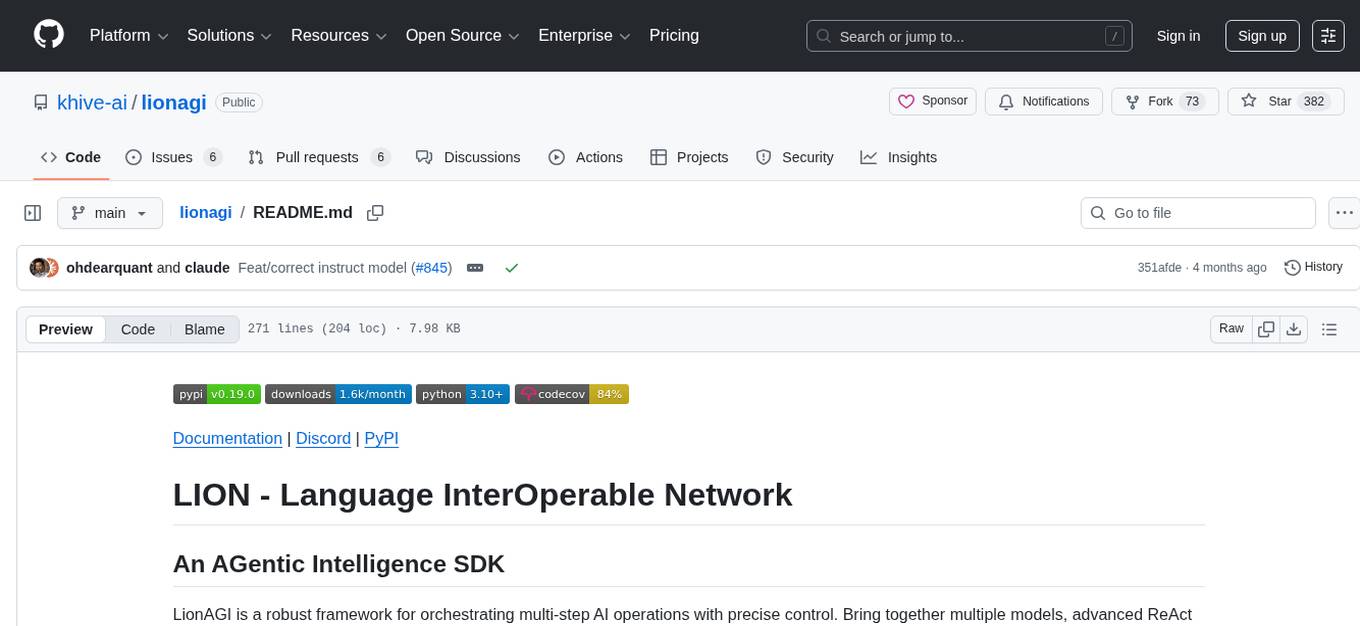
lionagi
LionAGI is a robust framework for orchestrating multi-step AI operations with precise control. It allows users to bring together multiple models, advanced reasoning, tool integrations, and custom validations in a single coherent pipeline. The framework is structured, expandable, controlled, and transparent, offering features like real-time logging, message introspection, and tool usage tracking. LionAGI supports advanced multi-step reasoning with ReAct, integrates with Anthropic's Model Context Protocol, and provides observability and debugging tools. Users can seamlessly orchestrate multiple models, integrate with Claude Code CLI SDK, and leverage a fan-out fan-in pattern for orchestration. The framework also offers optional dependencies for additional functionalities like reader tools, local inference support, rich output formatting, database support, and graph visualization.
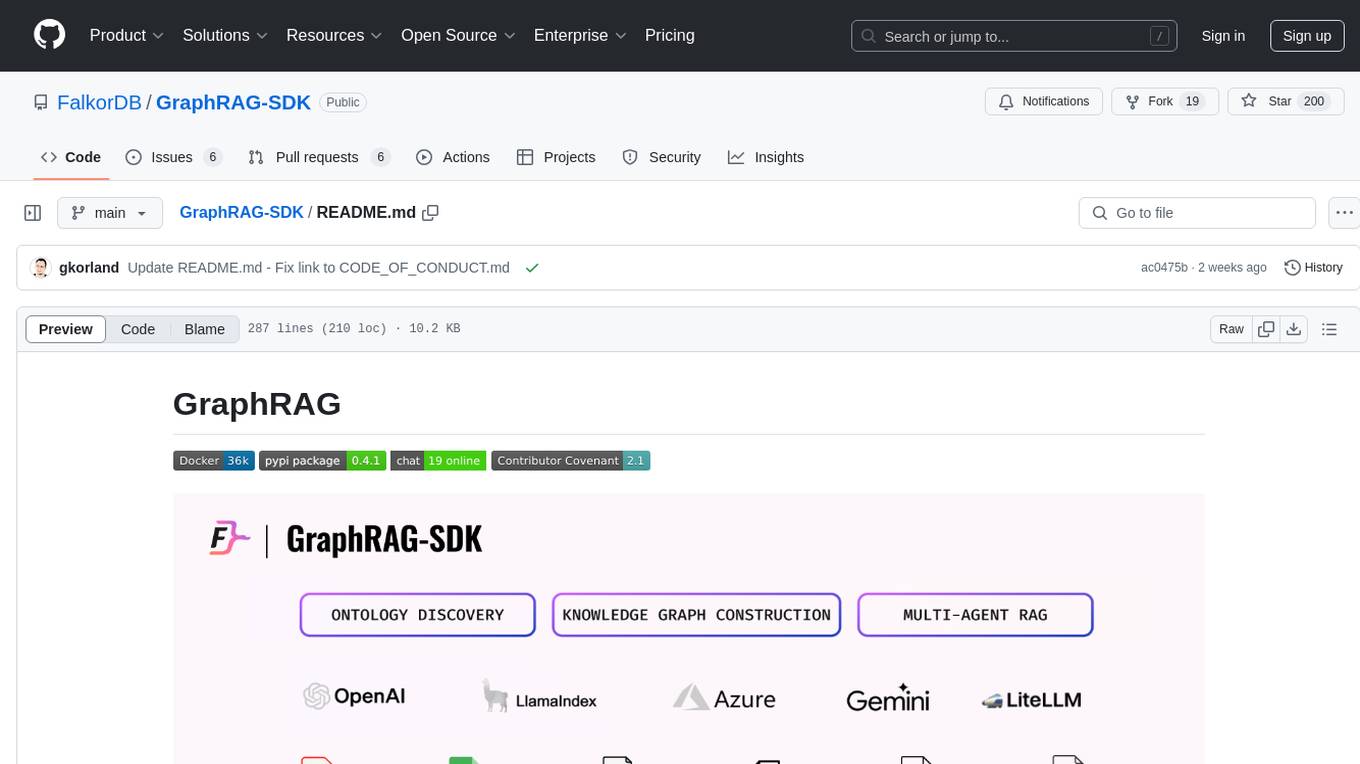
GraphRAG-SDK
Build fast and accurate GenAI applications with GraphRAG SDK, a specialized toolkit for building Graph Retrieval-Augmented Generation (GraphRAG) systems. It integrates knowledge graphs, ontology management, and state-of-the-art LLMs to deliver accurate, efficient, and customizable RAG workflows. The SDK simplifies the development process by automating ontology creation, knowledge graph agent creation, and query handling, enabling users to interact and query their knowledge graphs effectively. It supports multi-agent systems and orchestrates agents specialized in different domains. The SDK is optimized for FalkorDB, ensuring high performance and scalability for large-scale applications. By leveraging knowledge graphs, it enables semantic relationships and ontology-driven queries that go beyond standard vector similarity, enhancing retrieval-augmented generation capabilities.
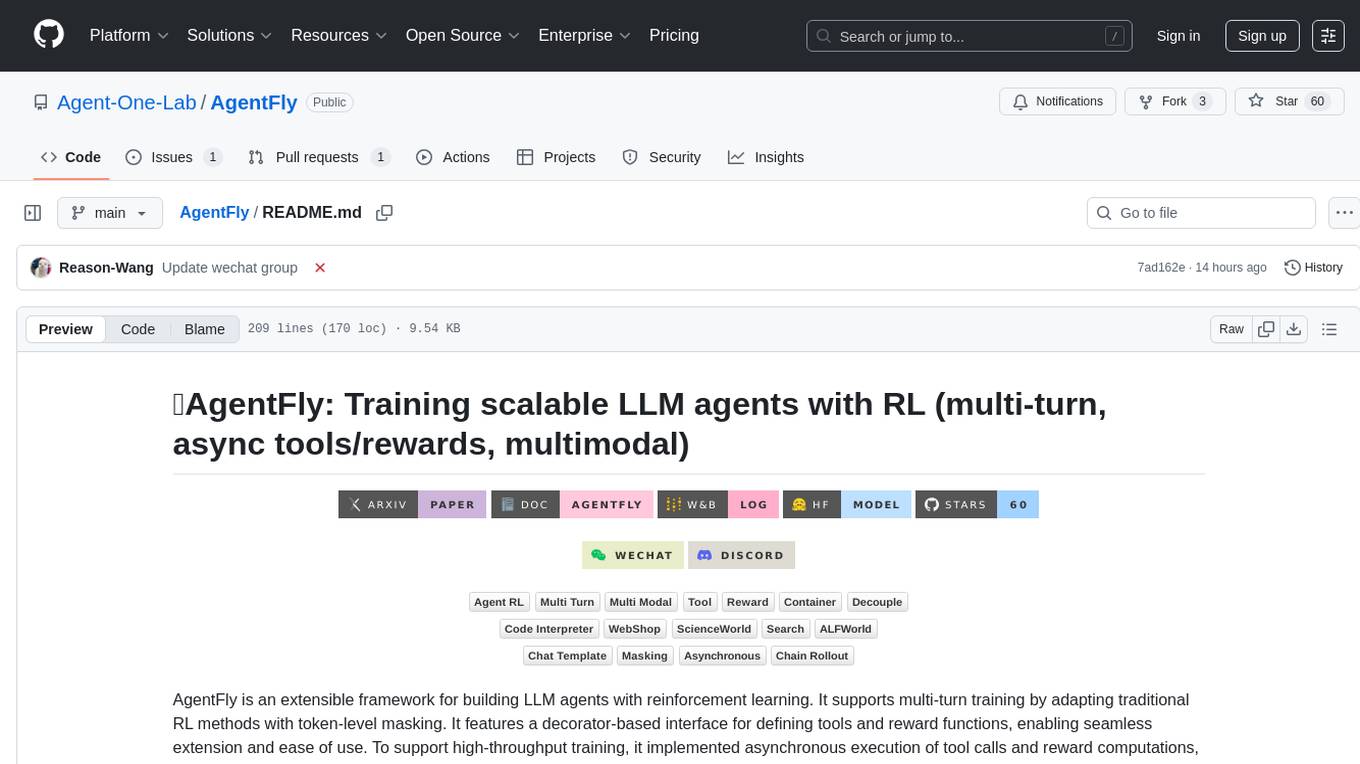
AgentFly
AgentFly is an extensible framework for building LLM agents with reinforcement learning. It supports multi-turn training by adapting traditional RL methods with token-level masking. It features a decorator-based interface for defining tools and reward functions, enabling seamless extension and ease of use. To support high-throughput training, it implemented asynchronous execution of tool calls and reward computations, and designed a centralized resource management system for scalable environment coordination. A suite of prebuilt tools and environments are provided.
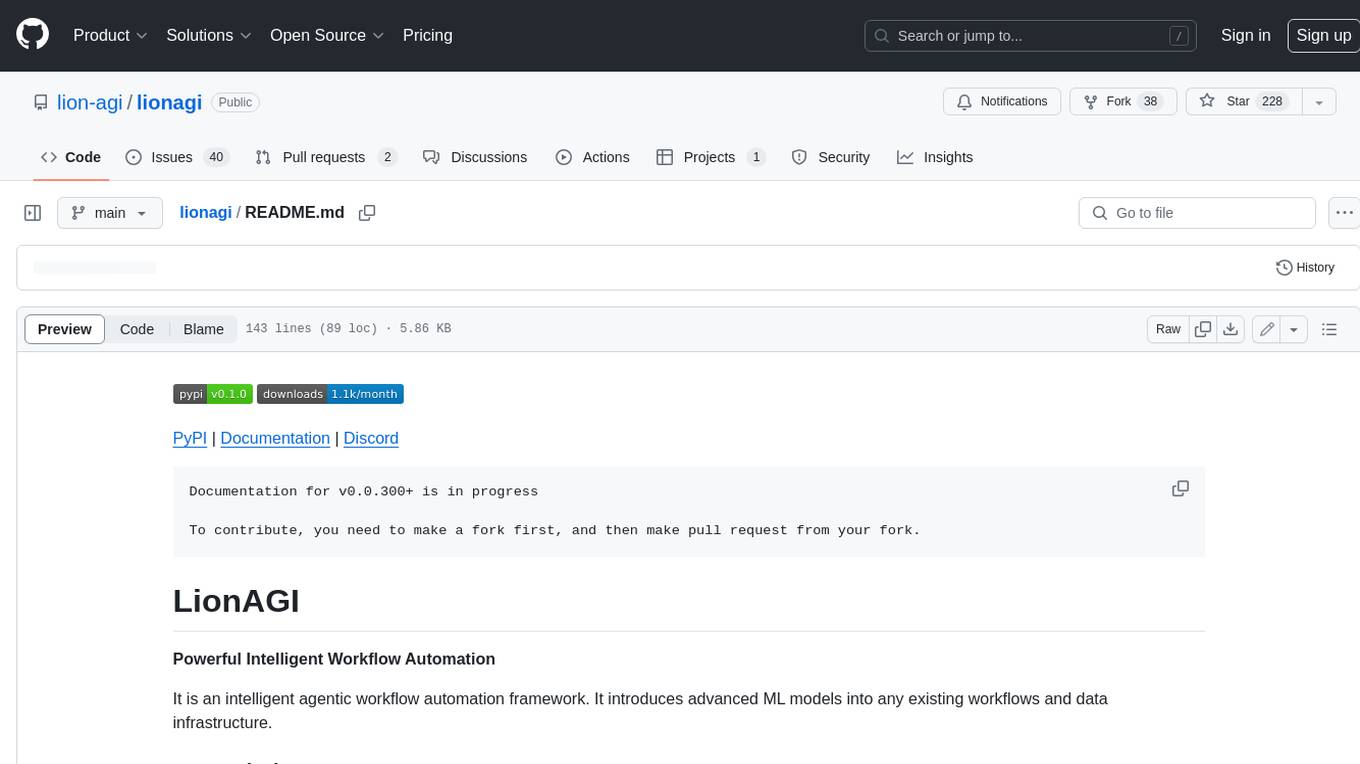
lionagi
LionAGI is a powerful intelligent workflow automation framework that introduces advanced ML models into any existing workflows and data infrastructure. It can interact with almost any model, run interactions in parallel for most models, produce structured pydantic outputs with flexible usage, automate workflow via graph based agents, use advanced prompting techniques, and more. LionAGI aims to provide a centralized agent-managed framework for "ML-powered tools coordination" and to dramatically lower the barrier of entries for creating use-case/domain specific tools. It is designed to be asynchronous only and requires Python 3.10 or higher.
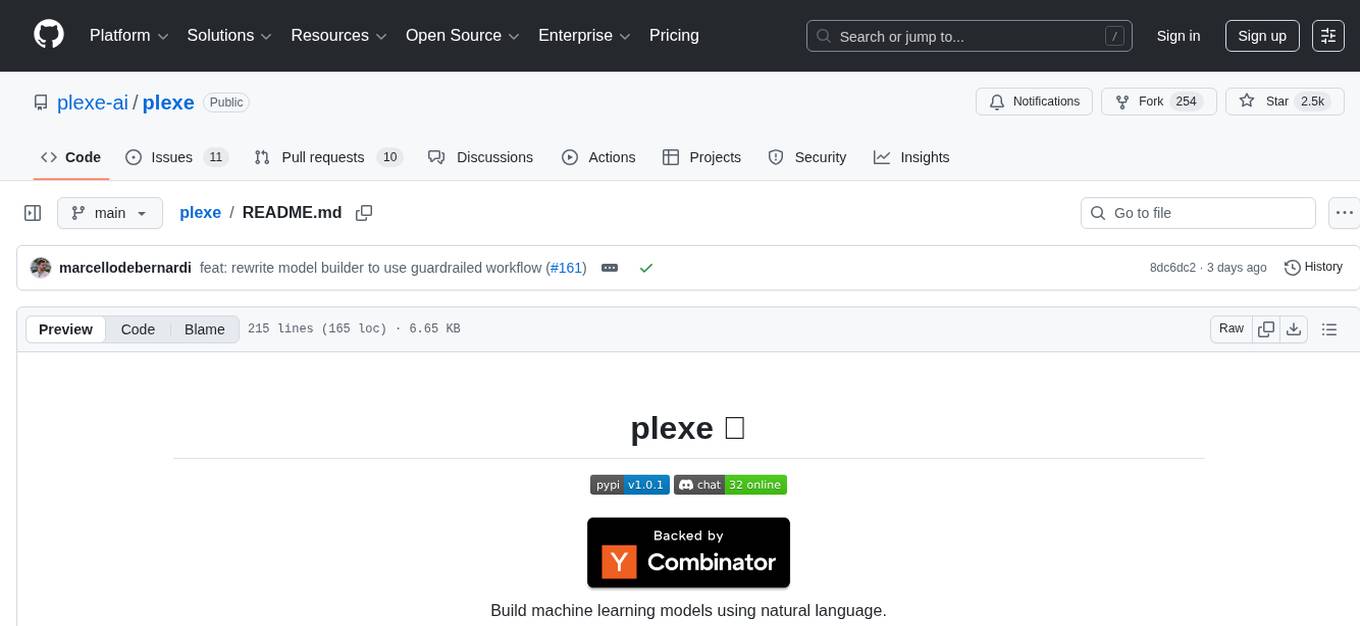
plexe
Plexe is a tool that allows users to create machine learning models by describing them in plain language. Users can explain their requirements, provide a dataset, and the AI-powered system will build a fully functional model through an automated agentic approach. It supports multiple AI agents and model building frameworks like XGBoost, CatBoost, and Keras. Plexe also provides Docker images with pre-configured environments, YAML configuration for customization, and support for multiple LiteLLM providers. Users can visualize experiment results using the built-in Streamlit dashboard and extend Plexe's functionality through custom integrations.
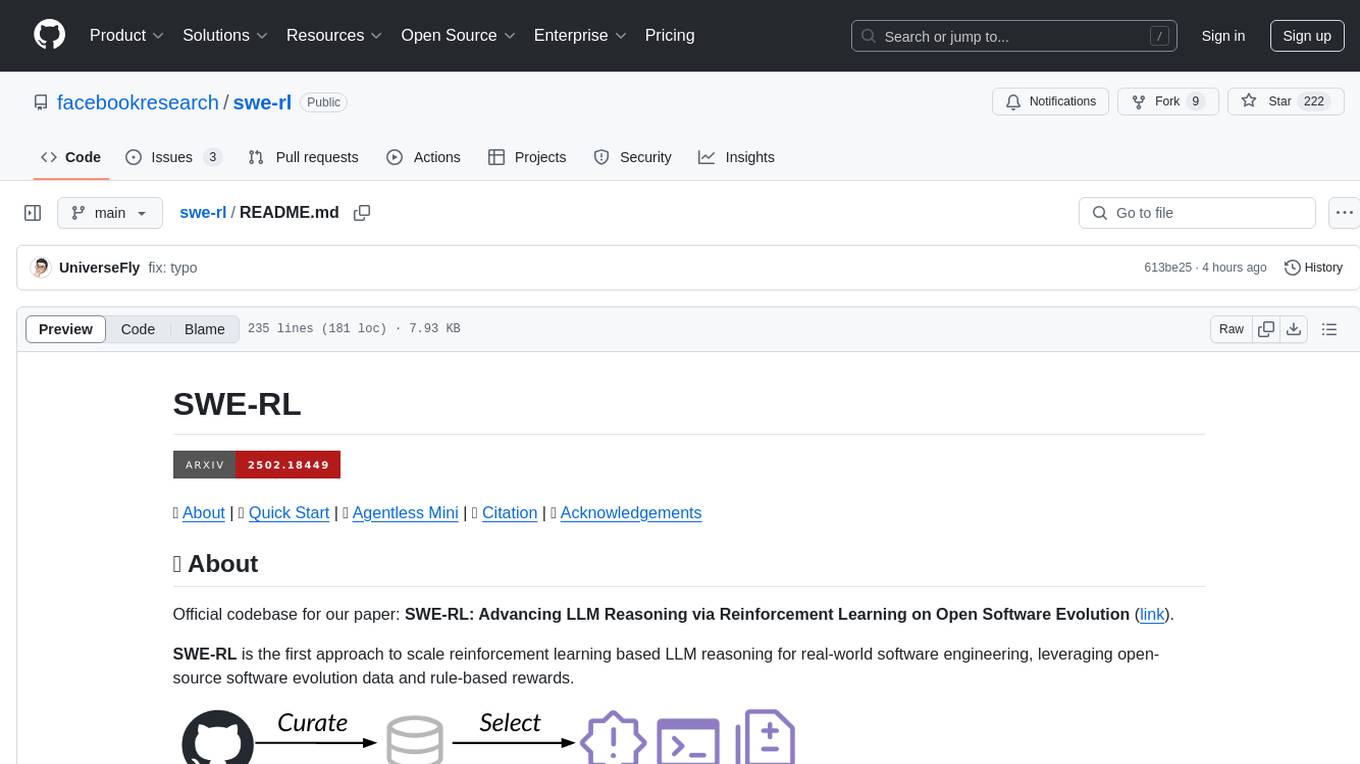
swe-rl
SWE-RL is the official codebase for the paper 'SWE-RL: Advancing LLM Reasoning via Reinforcement Learning on Open Software Evolution'. It is the first approach to scale reinforcement learning based LLM reasoning for real-world software engineering, leveraging open-source software evolution data and rule-based rewards. The code provides prompt templates and the implementation of the reward function based on sequence similarity. Agentless Mini, a part of SWE-RL, builds on top of Agentless with improvements like fast async inference, code refactoring for scalability, and support for using multiple reproduction tests for reranking. The tool can be used for localization, repair, and reproduction test generation in software engineering tasks.
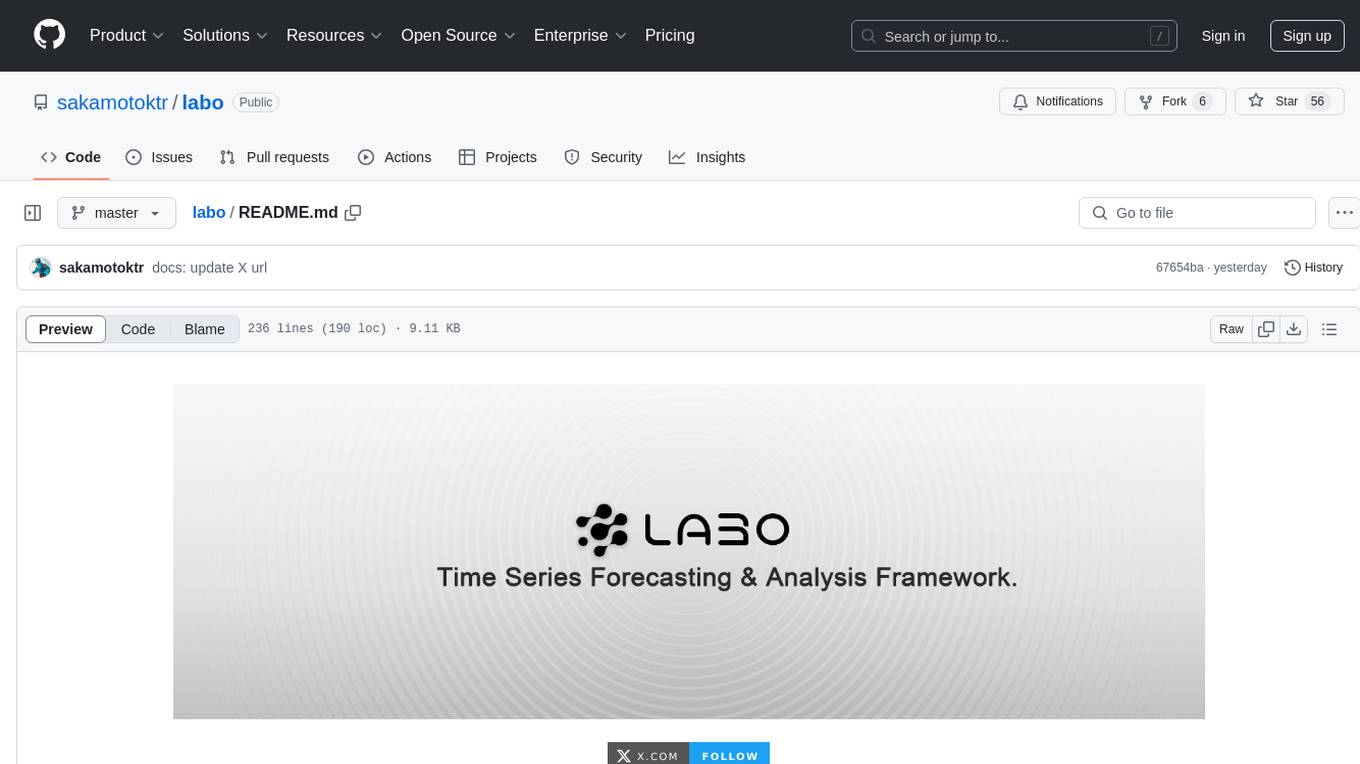
labo
LABO is a time series forecasting and analysis framework that integrates pre-trained and fine-tuned LLMs with multi-domain agent-based systems. It allows users to create and tune agents easily for various scenarios, such as stock market trend prediction and web public opinion analysis. LABO requires a specific runtime environment setup, including system requirements, Python environment, dependency installations, and configurations. Users can fine-tune their own models using LABO's Low-Rank Adaptation (LoRA) for computational efficiency and continuous model updates. Additionally, LABO provides a Python library for building model training pipelines and customizing agents for specific tasks.
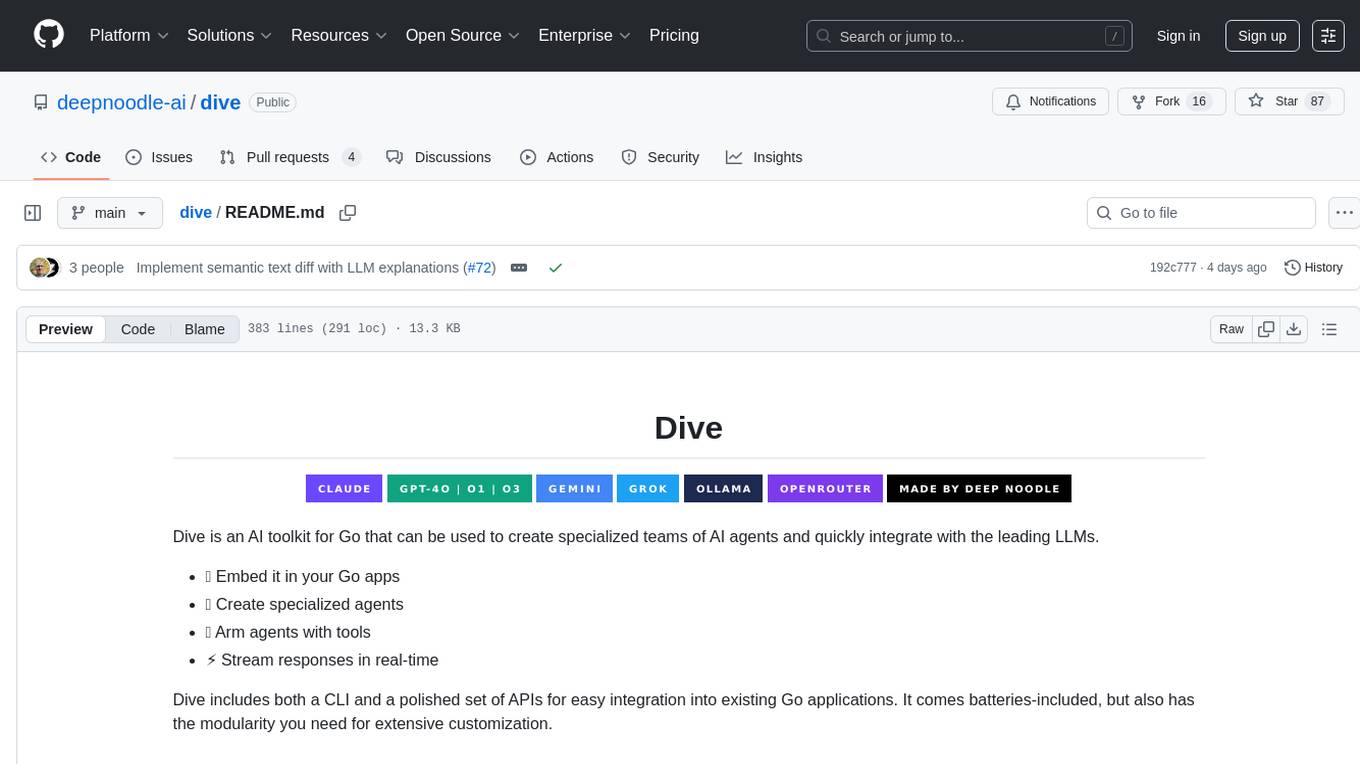
dive
Dive is an AI toolkit for Go that enables the creation of specialized teams of AI agents and seamless integration with leading LLMs. It offers a CLI and APIs for easy integration, with features like creating specialized agents, hierarchical agent systems, declarative configuration, multiple LLM support, extended reasoning, model context protocol, advanced model settings, tools for agent capabilities, tool annotations, streaming, CLI functionalities, thread management, confirmation system, deep research, and semantic diff. Dive also provides semantic diff analysis, unified interface for LLM providers, tool system with annotations, custom tool creation, and support for various verified models. The toolkit is designed for developers to build AI-powered applications with rich agent capabilities and tool integrations.
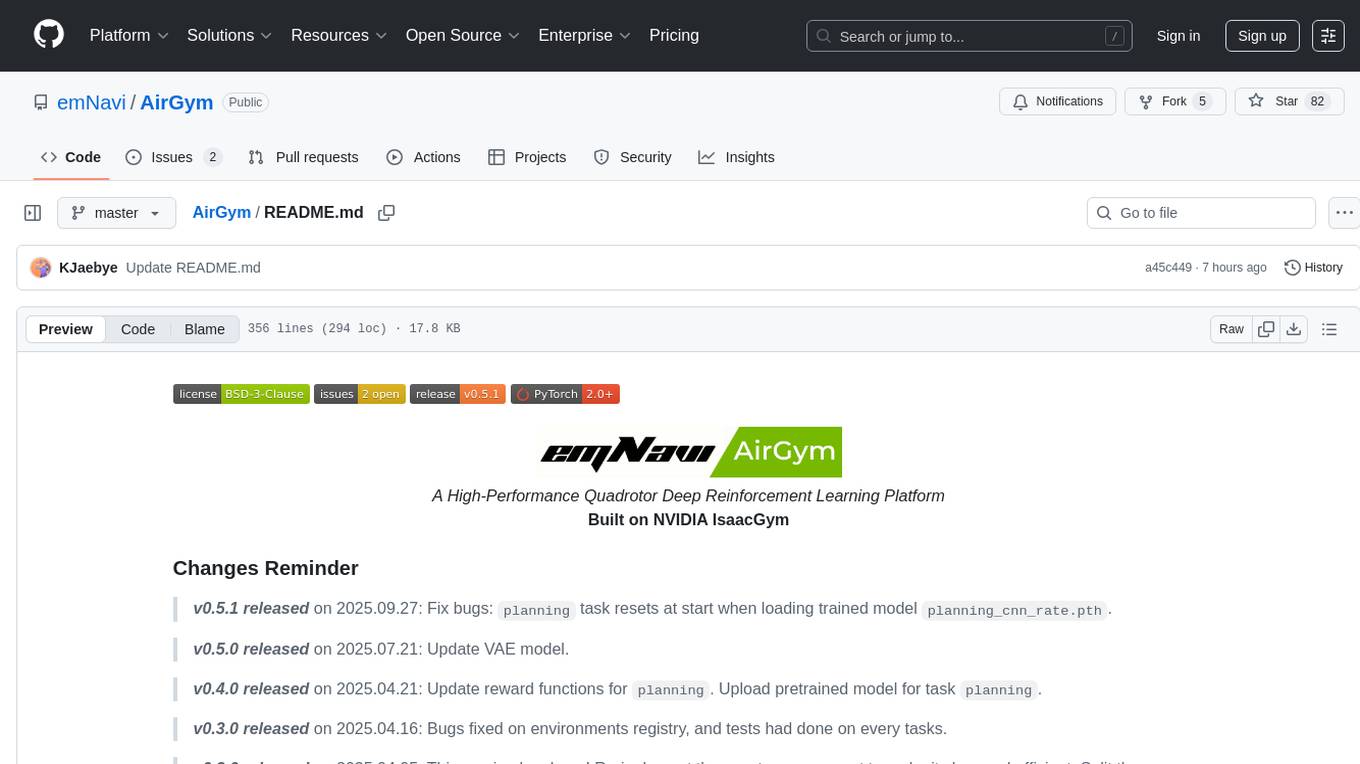
AirGym
AirGym is an open source Python quadrotor simulator based on IsaacGym, providing a high-fidelity dynamics and Deep Reinforcement Learning (DRL) framework for quadrotor robot learning research. It offers a lightweight and customizable platform with strict alignment with PX4 logic, multiple control modes, and Sim-to-Real toolkits. Users can perform tasks such as Hovering, Balloon, Tracking, Avoid, and Planning, with the ability to create customized environments and tasks. The tool also supports training from scratch, visual encoding approaches, playing and testing of trained models, and customization of new tasks and assets.
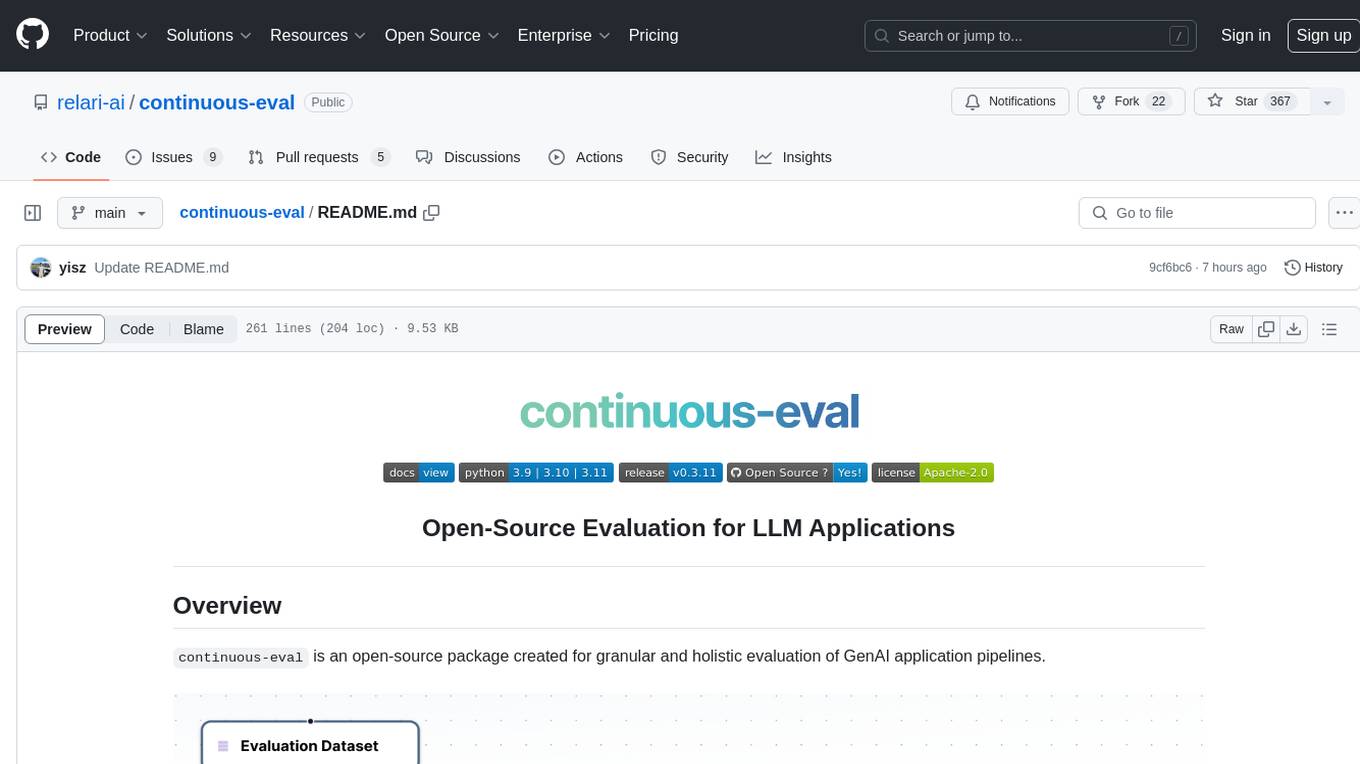
continuous-eval
Open-Source Evaluation for LLM Applications. `continuous-eval` is an open-source package created for granular and holistic evaluation of GenAI application pipelines. It offers modularized evaluation, a comprehensive metric library covering various LLM use cases, the ability to leverage user feedback in evaluation, and synthetic dataset generation for testing pipelines. Users can define their own metrics by extending the Metric class. The tool allows running evaluation on a pipeline defined with modules and corresponding metrics. Additionally, it provides synthetic data generation capabilities to create user interaction data for evaluation or training purposes.
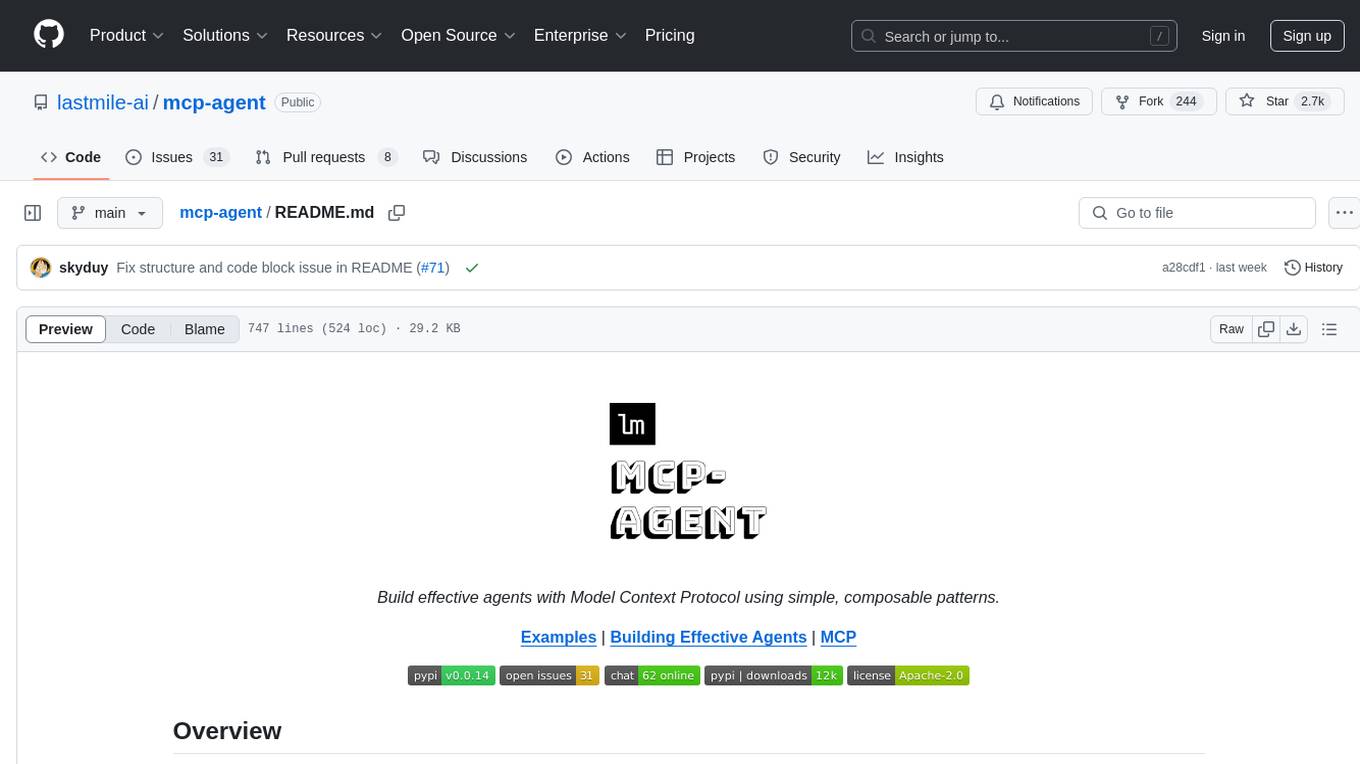
mcp-agent
mcp-agent is a simple, composable framework designed to build agents using the Model Context Protocol. It handles the lifecycle of MCP server connections and implements patterns for building production-ready AI agents in a composable way. The framework also includes OpenAI's Swarm pattern for multi-agent orchestration in a model-agnostic manner, making it the simplest way to build robust agent applications. It is purpose-built for the shared protocol MCP, lightweight, and closer to an agent pattern library than a framework. mcp-agent allows developers to focus on the core business logic of their AI applications by handling mechanics such as server connections, working with LLMs, and supporting external signals like human input.
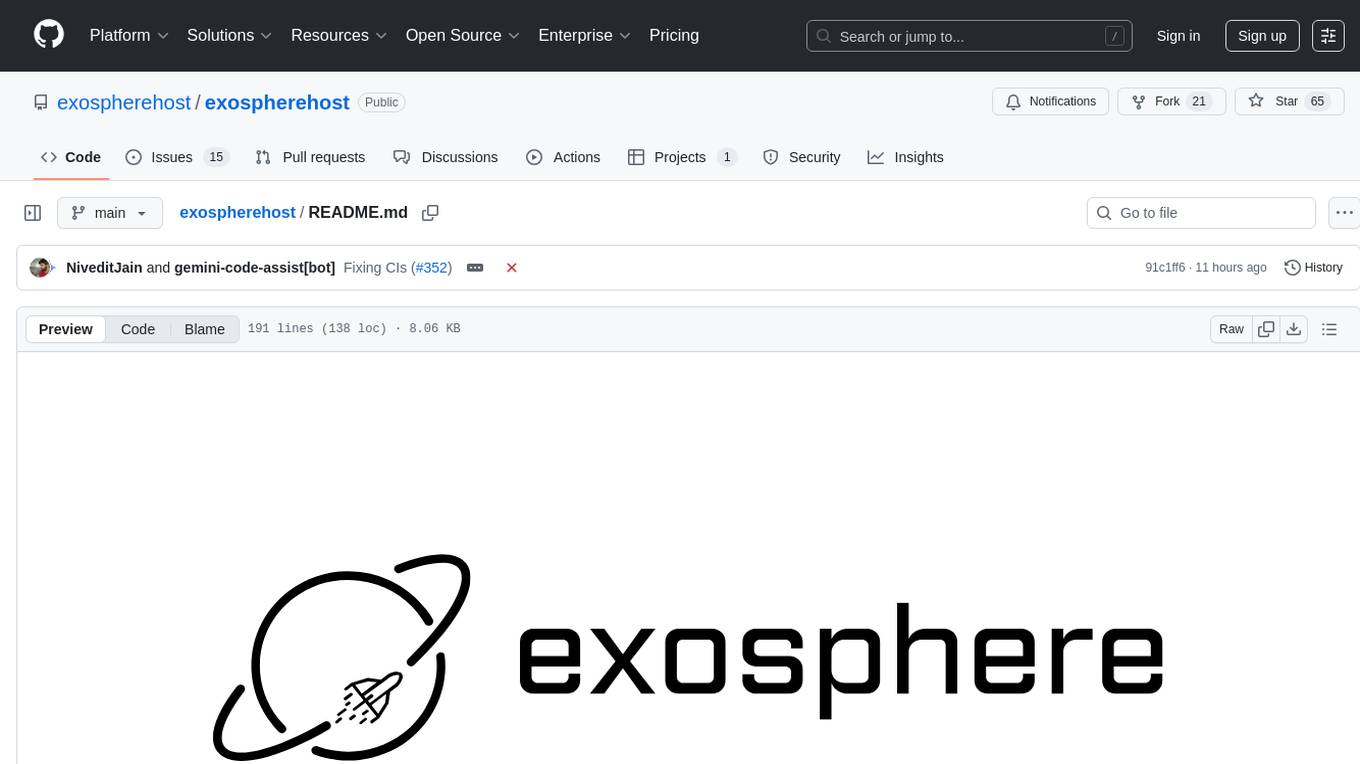
exospherehost
Exosphere is an open source infrastructure designed to run AI agents at scale for large data and long running flows. It allows developers to define plug and playable nodes that can be run on a reliable backbone in the form of a workflow, with features like dynamic state creation at runtime, infinite parallel agents, persistent state management, and failure handling. This enables the deployment of production agents that can scale beautifully to build robust autonomous AI workflows.
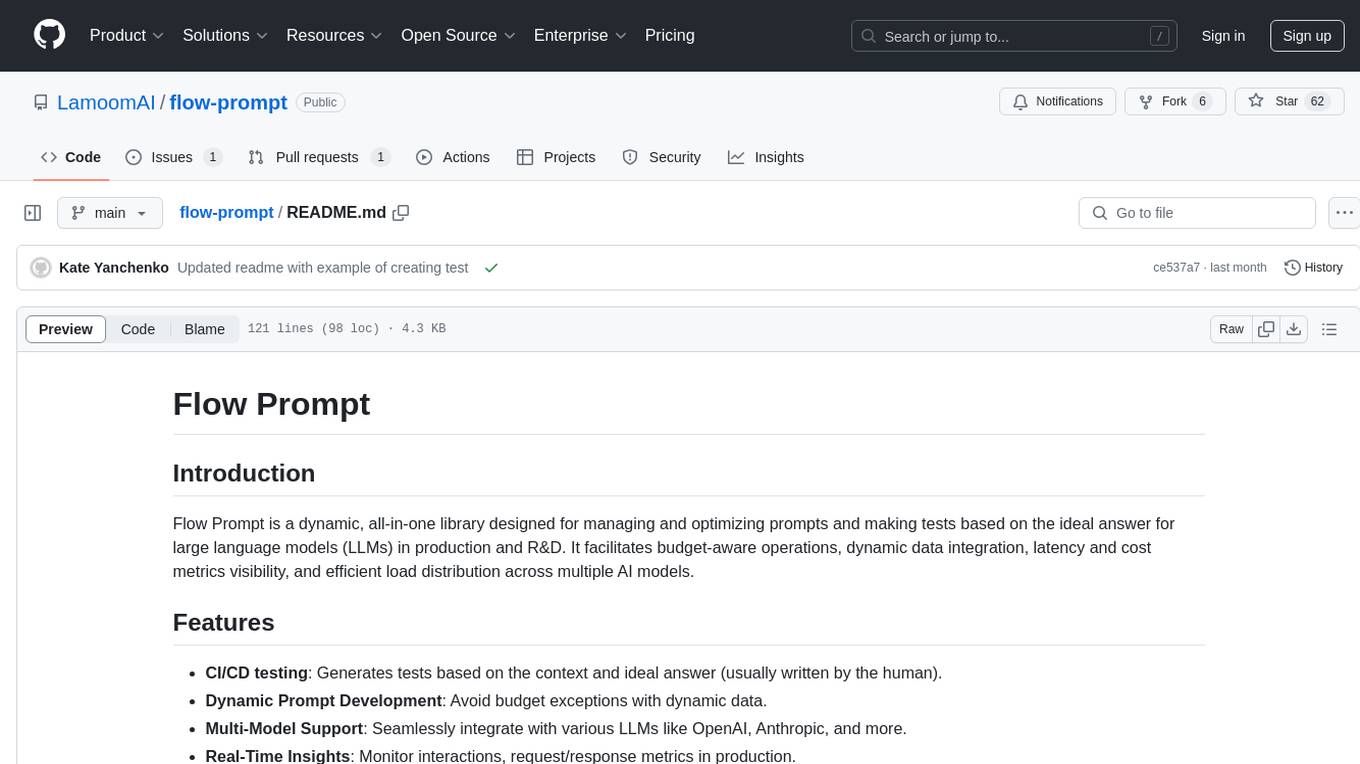
flow-prompt
Flow Prompt is a dynamic library for managing and optimizing prompts for large language models. It facilitates budget-aware operations, dynamic data integration, and efficient load distribution. Features include CI/CD testing, dynamic prompt development, multi-model support, real-time insights, and prompt testing and evolution.

semantic-kernel
Semantic Kernel is an SDK that integrates Large Language Models (LLMs) like OpenAI, Azure OpenAI, and Hugging Face with conventional programming languages like C#, Python, and Java. Semantic Kernel achieves this by allowing you to define plugins that can be chained together in just a few lines of code. What makes Semantic Kernel _special_ , however, is its ability to _automatically_ orchestrate plugins with AI. With Semantic Kernel planners, you can ask an LLM to generate a plan that achieves a user's unique goal. Afterwards, Semantic Kernel will execute the plan for the user.
For similar tasks
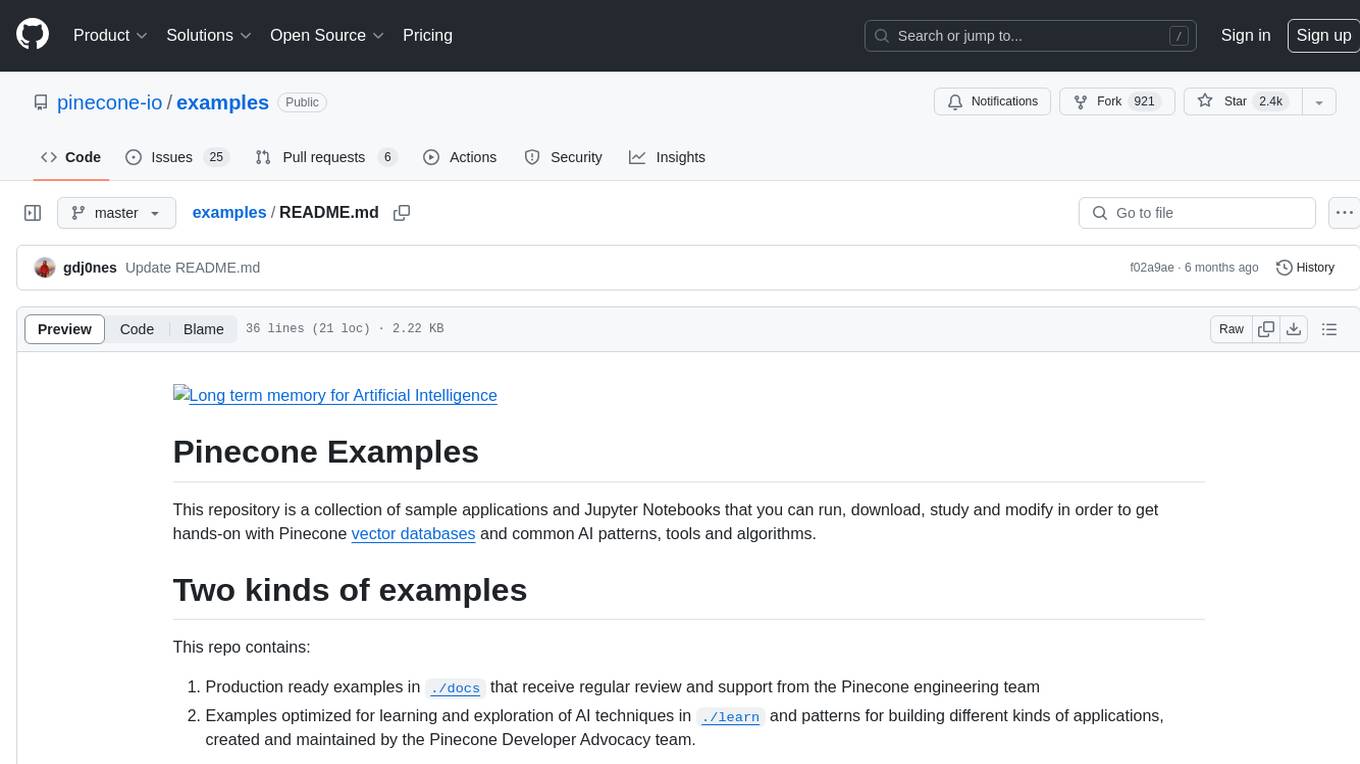
examples
This repository contains a collection of sample applications and Jupyter Notebooks for hands-on experience with Pinecone vector databases and common AI patterns, tools, and algorithms. It includes production-ready examples for review and support, as well as learning-optimized examples for exploring AI techniques and building applications. Users can contribute, provide feedback, and collaborate to improve the resource.

OpenAGI
OpenAGI is an AI agent creation package designed for researchers and developers to create intelligent agents using advanced machine learning techniques. The package provides tools and resources for building and training AI models, enabling users to develop sophisticated AI applications. With a focus on collaboration and community engagement, OpenAGI aims to facilitate the integration of AI technologies into various domains, fostering innovation and knowledge sharing among experts and enthusiasts.
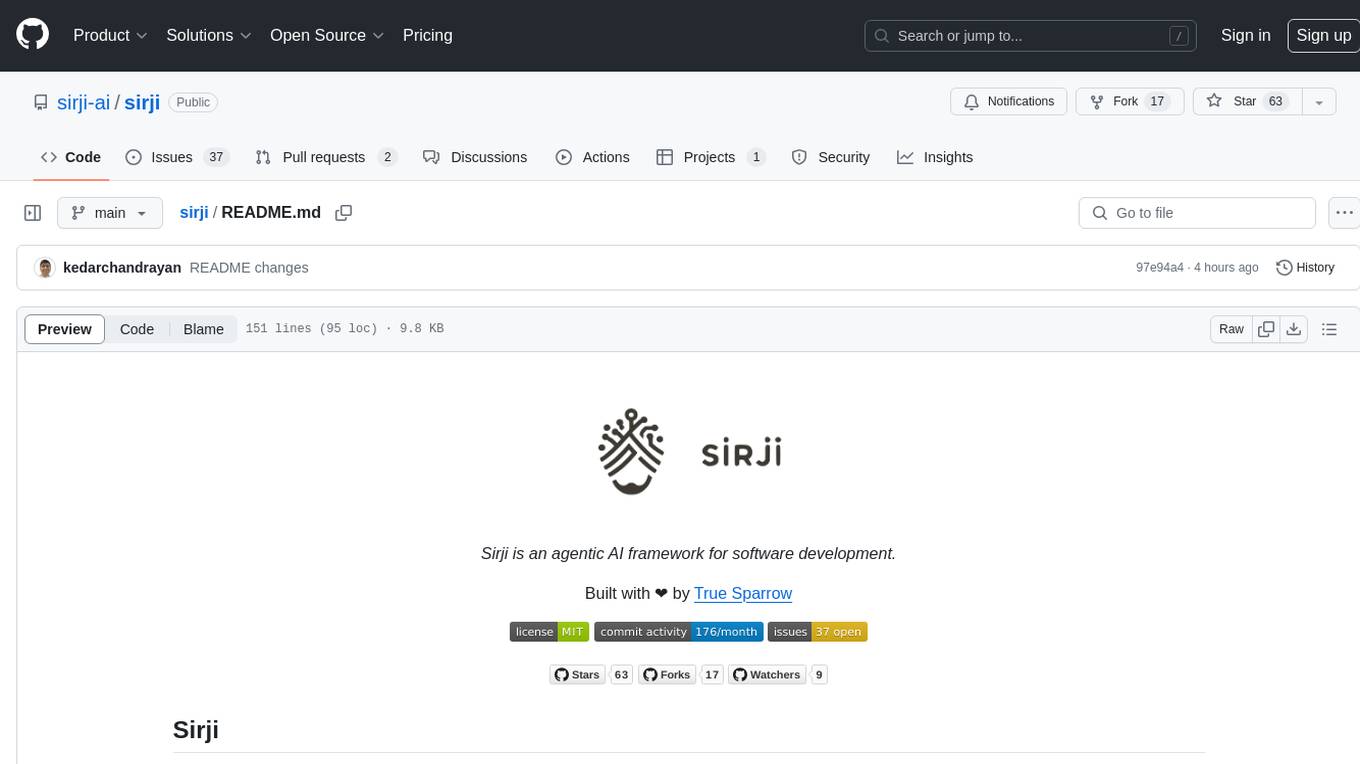
sirji
Sirji is an agentic AI framework for software development where various AI agents collaborate via a messaging protocol to solve software problems. It uses standard or user-generated recipes to list tasks and tips for problem-solving. Agents in Sirji are modular AI components that perform specific tasks based on custom pseudo code. The framework is currently implemented as a Visual Studio Code extension, providing an interactive chat interface for problem submission and feedback. Sirji sets up local or remote development environments by installing dependencies and executing generated code.
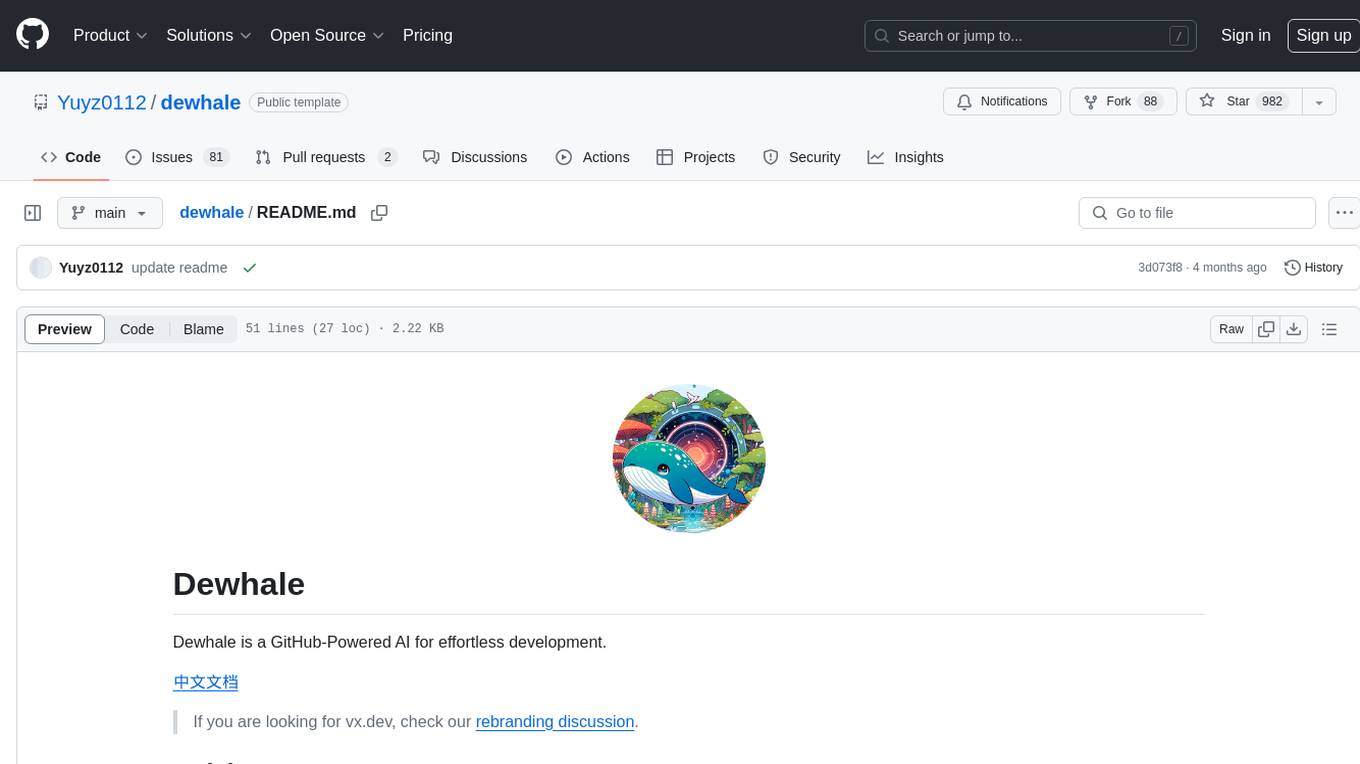
dewhale
Dewhale is a GitHub-Powered AI tool designed for effortless development. It utilizes prompt engineering techniques under the GPT-4 model to issue commands, allowing users to generate code with lower usage costs and easy customization. The tool seamlessly integrates with GitHub, providing version control, code review, and collaborative features. Users can join discussions on the design philosophy of Dewhale and explore detailed instructions and examples for setting up and using the tool.
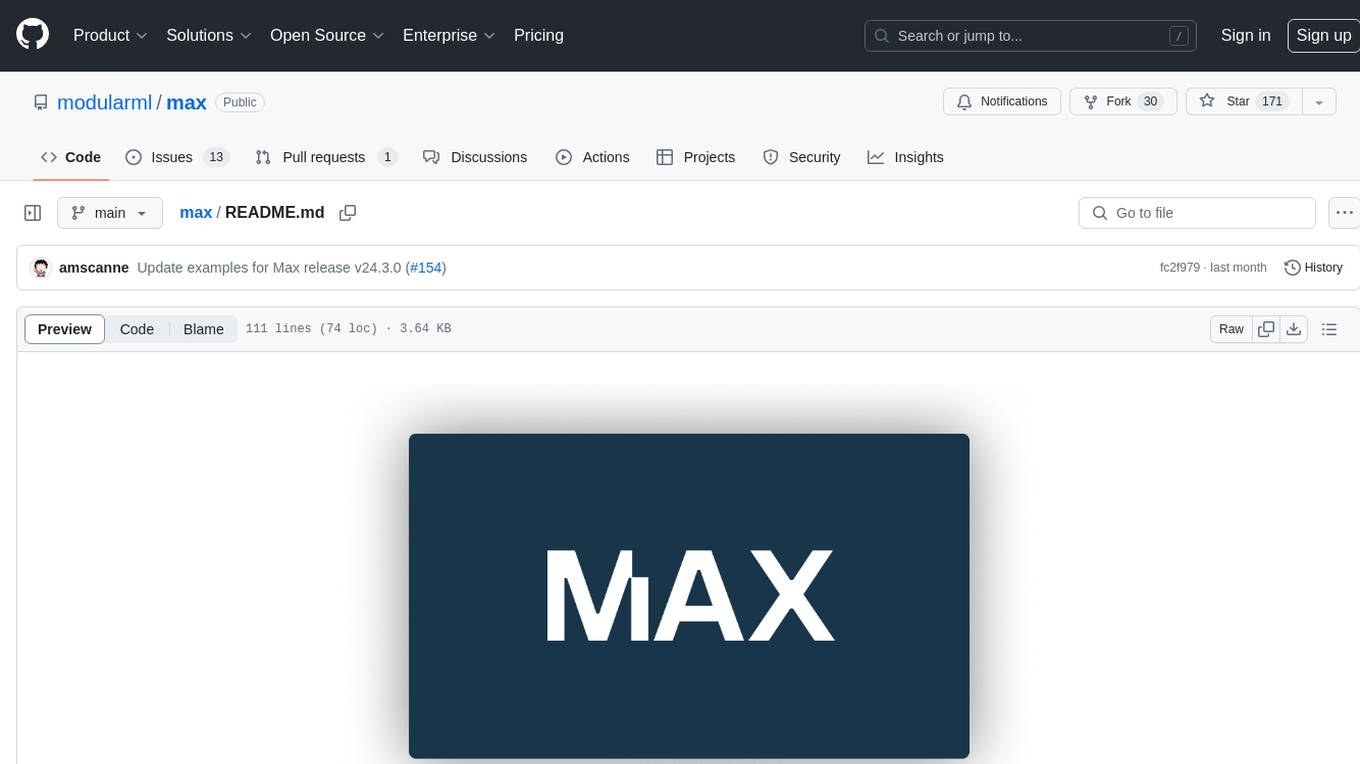
max
The Modular Accelerated Xecution (MAX) platform is an integrated suite of AI libraries, tools, and technologies that unifies commonly fragmented AI deployment workflows. MAX accelerates time to market for the latest innovations by giving AI developers a single toolchain that unlocks full programmability, unparalleled performance, and seamless hardware portability.
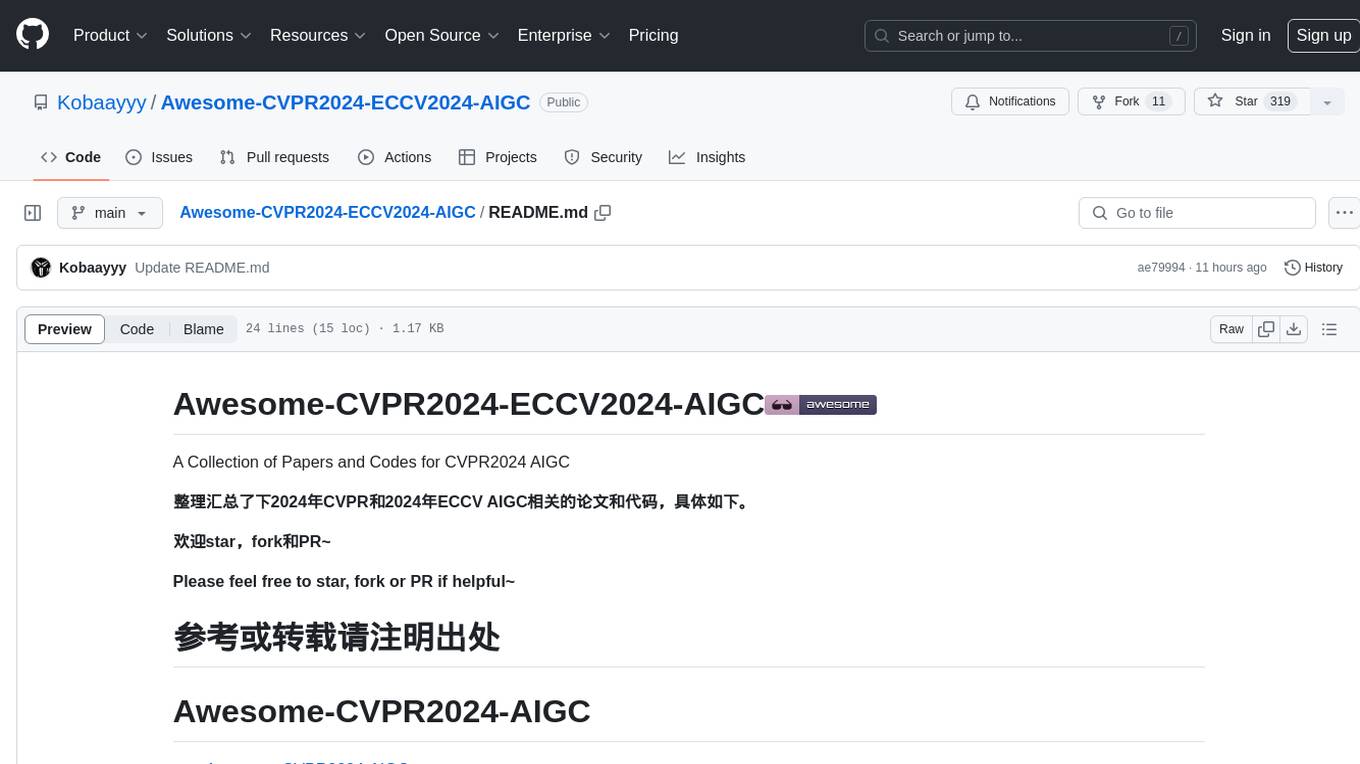
Awesome-CVPR2024-ECCV2024-AIGC
A Collection of Papers and Codes for CVPR 2024 AIGC. This repository compiles and organizes research papers and code related to CVPR 2024 and ECCV 2024 AIGC (Artificial Intelligence and Graphics Computing). It serves as a valuable resource for individuals interested in the latest advancements in the field of computer vision and artificial intelligence. Users can find a curated list of papers and accompanying code repositories for further exploration and research. The repository encourages collaboration and contributions from the community through stars, forks, and pull requests.
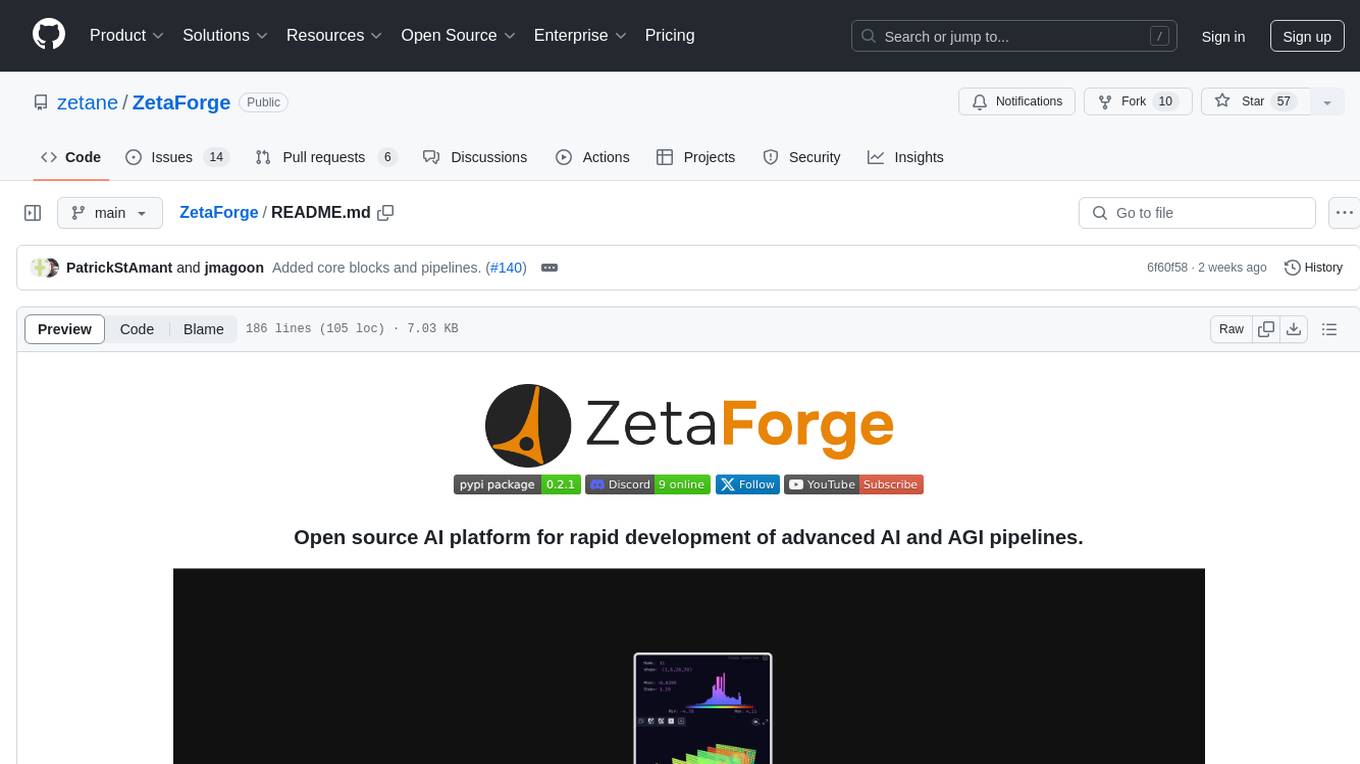
ZetaForge
ZetaForge is an open-source AI platform designed for rapid development of advanced AI and AGI pipelines. It allows users to assemble reusable, customizable, and containerized Blocks into highly visual AI Pipelines, enabling rapid experimentation and collaboration. With ZetaForge, users can work with AI technologies in any programming language, easily modify and update AI pipelines, dive into the code whenever needed, utilize community-driven blocks and pipelines, and share their own creations. The platform aims to accelerate the development and deployment of advanced AI solutions through its user-friendly interface and community support.
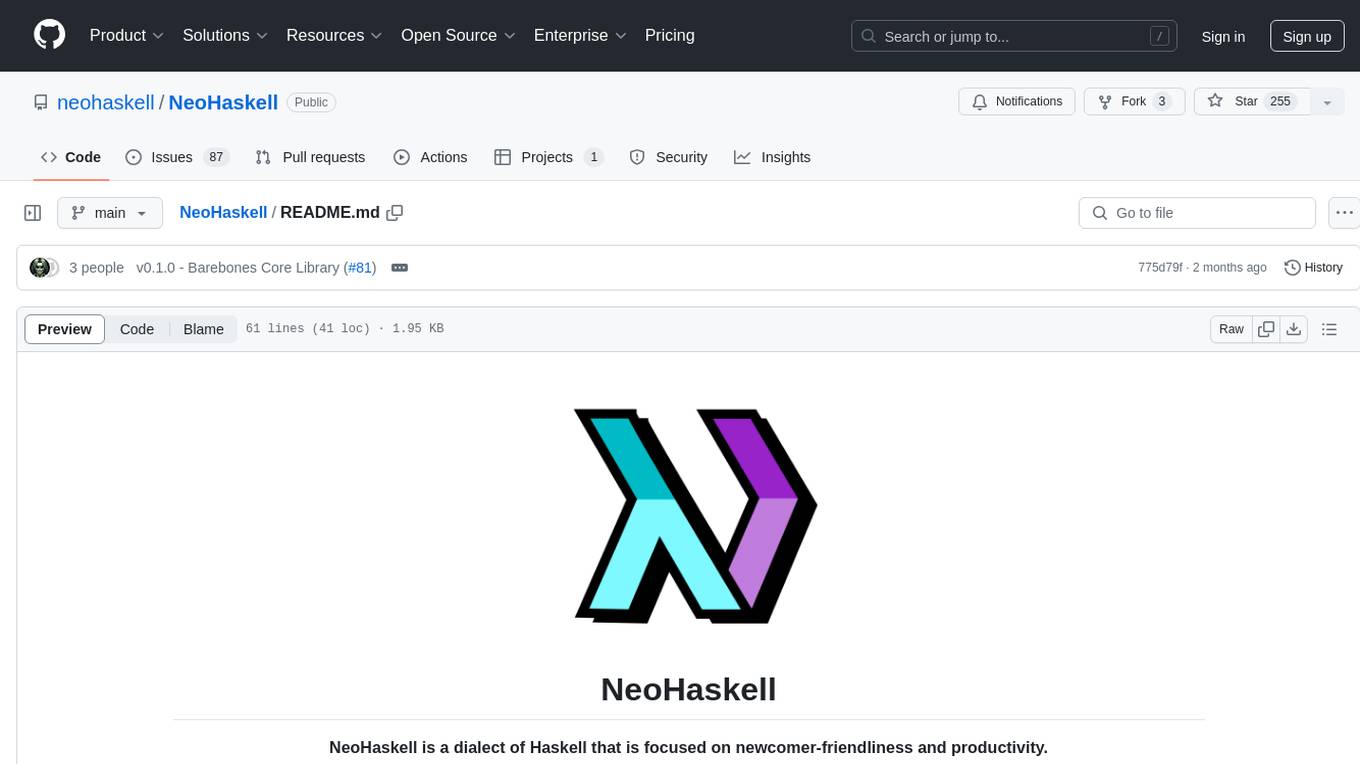
NeoHaskell
NeoHaskell is a newcomer-friendly and productive dialect of Haskell. It aims to be easy to learn and use, while also powerful enough for app development with minimal effort and maximum confidence. The project prioritizes design and documentation before implementation, with ongoing work on design documents for community sharing.
For similar jobs

sweep
Sweep is an AI junior developer that turns bugs and feature requests into code changes. It automatically handles developer experience improvements like adding type hints and improving test coverage.

teams-ai
The Teams AI Library is a software development kit (SDK) that helps developers create bots that can interact with Teams and Microsoft 365 applications. It is built on top of the Bot Framework SDK and simplifies the process of developing bots that interact with Teams' artificial intelligence capabilities. The SDK is available for JavaScript/TypeScript, .NET, and Python.

ai-guide
This guide is dedicated to Large Language Models (LLMs) that you can run on your home computer. It assumes your PC is a lower-end, non-gaming setup.

classifai
Supercharge WordPress Content Workflows and Engagement with Artificial Intelligence. Tap into leading cloud-based services like OpenAI, Microsoft Azure AI, Google Gemini and IBM Watson to augment your WordPress-powered websites. Publish content faster while improving SEO performance and increasing audience engagement. ClassifAI integrates Artificial Intelligence and Machine Learning technologies to lighten your workload and eliminate tedious tasks, giving you more time to create original content that matters.

chatbot-ui
Chatbot UI is an open-source AI chat app that allows users to create and deploy their own AI chatbots. It is easy to use and can be customized to fit any need. Chatbot UI is perfect for businesses, developers, and anyone who wants to create a chatbot.

BricksLLM
BricksLLM is a cloud native AI gateway written in Go. Currently, it provides native support for OpenAI, Anthropic, Azure OpenAI and vLLM. BricksLLM aims to provide enterprise level infrastructure that can power any LLM production use cases. Here are some use cases for BricksLLM: * Set LLM usage limits for users on different pricing tiers * Track LLM usage on a per user and per organization basis * Block or redact requests containing PIIs * Improve LLM reliability with failovers, retries and caching * Distribute API keys with rate limits and cost limits for internal development/production use cases * Distribute API keys with rate limits and cost limits for students

uAgents
uAgents is a Python library developed by Fetch.ai that allows for the creation of autonomous AI agents. These agents can perform various tasks on a schedule or take action on various events. uAgents are easy to create and manage, and they are connected to a fast-growing network of other uAgents. They are also secure, with cryptographically secured messages and wallets.

griptape
Griptape is a modular Python framework for building AI-powered applications that securely connect to your enterprise data and APIs. It offers developers the ability to maintain control and flexibility at every step. Griptape's core components include Structures (Agents, Pipelines, and Workflows), Tasks, Tools, Memory (Conversation Memory, Task Memory, and Meta Memory), Drivers (Prompt and Embedding Drivers, Vector Store Drivers, Image Generation Drivers, Image Query Drivers, SQL Drivers, Web Scraper Drivers, and Conversation Memory Drivers), Engines (Query Engines, Extraction Engines, Summary Engines, Image Generation Engines, and Image Query Engines), and additional components (Rulesets, Loaders, Artifacts, Chunkers, and Tokenizers). Griptape enables developers to create AI-powered applications with ease and efficiency.



